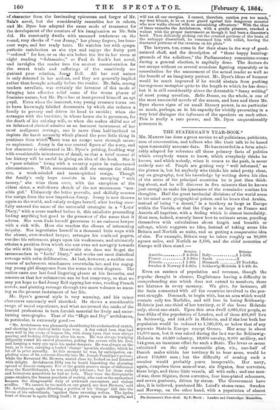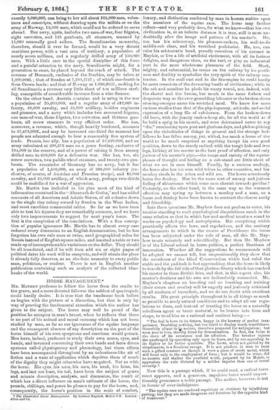THE STATESMAN'S YEAR-BOOK.*
Mn. MARTIN has done a great service to all politicians, publicists, men of conversation, and talkers who like their talk to be based upon reasonably accurate data. He has recorded in a form admi- rably adapted for reference all those primary facts of politics which everybody wants to know, which everybody thinks he knows, and which nobody, when it comes to the push, is never entirely sure of. People are getting very " well informed," as the phrase is, but let anybody who thinks his mind pretty clear, say on geography, test his knowledge by writing down his idea of the areas of the principal countries he is just then think- ing about, and lie will discover in five minutes that he knows just enough to make his ignorance of the remainder• confuse his thoughts. Half the great territorial divisions of the world seem to his mind mere geographical points, and he hears that Arabia, instead of being " a desert," is a territory as large as Europe within the Vistula, or that the Cape is as large as France and Austria all together, with a feeling which is almost incredulity. Most men, indeed, scarcely know how to estimate areas, puzzling themselves with calculations about length and breadth or mileage, which suggests no idea, instead of taking areas like Britain and Norfolk as units, and so getting a comparative idea of size. For example, Britain may be taken roughly as 90,000 square miles, and Norfolk as 2,100, and the chief countries of Europe will then stand :— Means. Britains.
..2 2-3rds Italy ..1 1-10th 2 2-9ths Spain ...........2
Prussia. 1 1-9th Denmark 10 Norfolks. Sweden & Norway 3 3-9ths Schleswig-Holstein 3 1-4th do.
Even on matters of population and revenue, though the popular thought is clearer, Englishmen having a difficulty in comprehending size which does not extend to numbers, there are hiatuses in every memory. We give, for instance, all the facts connected with all the countries involved in the pre- sent struggle. Denmark, to begin with, has an area which would contain only ten Norfolks, and will lose in losing Schleswig- Holstein just one-third of her territory, or if she loses Holstein only, about one-sixth. Upon this area dwell 2,605,024 people, or four-fifths of the population of London, and of these 409,907 live in Schleswig, and 544,411) in Holstein, and if she lost both her population would be reduced to 1,700,000, or below that of any separate State in Europe except Greece. Her army is about 12,000 men, but it was raised during the last war for• Schleswig- Holstein to 49,300 infantry, 10,600 cavalry, 9,000 artillery, and 144 guns, an immense effort for such a State. The levee en masse calculated on the only reasonable plan, viz., one-half of Danish males within her territory fit to bear arms, would be about 170,000 men ; but the difficulty of arming such a number would probably prove insuperable. Her navy, again, comprises three men-of-war, six frigates, four corvettes, three brigs, and three little vessels, all with sails ; and one man- of-war, three frigates, three corvettes, four• iron-plated schooners, and seven gunboats, driven by steam. The Government have also, it is believed, purchased Mr. Laird's steam rams. Sweden and Norway, on the other hand, with a population of almost The Statesman's Tear-Book. By F. Marti-. London and Cambridge: Macmillan.
Austria France
exactly 5,000,000, can bring to her aid about 102,000 men, volun- teers and conscripts, without drawing upon the militia or on the army of Norway, 12,000 men, which could not be ordered to serve abroad. Her navy, again, includes two men-of-war, four frigates, eight corvettes, and 125 gunboats, all steamers, manned by 15,000 annually good sailors. The Scandinavian monarchy, therefore, should it ever be formed, would be a very decent maritime power, with a vast area of territory, a population of nearly seven millions, and a regularly drilled army of 150,000 men. With a little care in the special discipline of this force and a painful attention to the navy, Scandinavia might, for a generation to come, be placed beyond the reach of attack. The revenue of Denmark, exclusive of the Duchies, may be taken at 1,200,000/. ; that of Sweden at 7,290,271/. ; of which one-fourth is from Crown lands ; and that of Norway at 1,036,02-2/., making for all Scandinavia a revenue very little short of ten millions sterl- ing, susceptible of considerable increase from a wise finance.
On the other hand, Austria contains and is using in the war a population of 35,000,000, and a regular army of 442,000 in- fantry, 58,000 cavalry, and 55,000 artillery, besides engineers and pioneers, and a navy which includes two armoured frigates, one man-of-war; three frigates, two corvettes, and thirteen gun-
boats, all screw steamers in very efficient order. She has, moreover, a revenue, which, though heavily burdened, amounts to 37,473,0001., and may be increased one-third the moment her people are educated enough to bear a reasonably free system of trade. Prussia, her ally, has a population of 18,229,000, and an army calculated at 208,570 men on a peace footing, exclusive of 104,000 in the reserve, and of a power of raising it from among drilled men to 609,000 for a defensive war. She has, too, six screw corvettes, two paddle-wheel steamers, and twenty-two gun- boats. The remainder of Germany has no navy, but it has a population of 1,500,000, an army of 200,000 infantry (ex- clusive, of course, of Austrian and Prussian troops), and 25,000 cavalry, and 10,000 artillery, of which army, perhaps two-thirds .could be mobilized for a war of aggression.
Mr. Martin has included in his plan most of the kind of information contained in the " Almanach de Gotha," and has added accounts of all American and Asiatic States, of all colonies down to the single tiny colony owned by Sweden in the West Indies, and most excellent commercial tables. So far as we have been able to test his figures they are remarkably accurate, and we have only two improvements to suggest for next year's issue. The first is the completion of the translations. With a fine concep- tion of popular ignorance Mr. Martin has in almost every case reduced every dimension to an English denomination, but he has forgotten his own rule once or twice, used geographical miles for Russia instead of English square miles, and inserted a table or two anade up of incomprehensible variations on the dollar. They should be all translated, and if he will then add six or eight pages of political dates his work will be complete, and will obtain the place it already fully deserves, as an absolute necessity to every public man, politician, or student. There is not in English another publication containing such an analysis of the collected blue- books of the world.

































 Previous page
Previous page